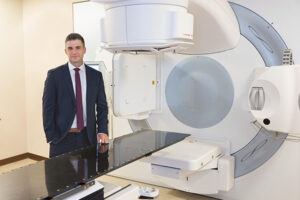Colorectal and Anal Cancer Treatment Options
Fighting colorectal and anal cancer with pinpoint accuracy.
At MRO, we use radiation, or radiotherapy, to destroy cancer cells, which are more susceptible to radiation than normal cells. Using state-of-the-art imaging techniques such as MRI, CT, and PET, your MRO care team can pinpoint radiation doses down to the millimeter.
Radiation therapy may be used for colorectal or anal cancer for several reasons, including:
- With anal cancer, radiotherapy is often the primary treatment, so you may avoid surgery altogether.
- Radiation before surgery may help shrink tumors, so they are easier to remove.
- After surgery, radiation therapy may help kill cancer cells that have been left behind.
- Radiation therapy may be an option for patients who are unable to undergo surgery.
- When used as palliative treatment, radiation therapy helps to shrink tumors that may be causing a blockage in the colon or intestines.
- Radiation therapy is often given in conjunction with chemotherapy.
![]()
 There are several different techniques used in colon cancer treatment, but most of them direct precise doses of radiation at cancer cells, using a machine called a linear accelerator (LINAC). Like an x-ray, radiation therapy is painless. Common types of radiation therapy include:
There are several different techniques used in colon cancer treatment, but most of them direct precise doses of radiation at cancer cells, using a machine called a linear accelerator (LINAC). Like an x-ray, radiation therapy is painless. Common types of radiation therapy include:
External beam radiation therapy (EBRT): EBRT delivers high doses of radiation to cancer cells from outside the body, using a variety of machine-based technologies.
3-D conformal radiation therapy is a technique where the beams of radiation used in treatment are shaped to match the tumor, using targeting information to focus precisely on the tumor.
Intensity modulated radiation therapy (IMRT): An advanced form of 3D therapy. First, a treatment plan is optimized in the computer planning system. During treatment, the machine moves around you as it delivers radiation. It shapes the beams and adjusts the intensity of the beams from all angles to limit the dose reaching nearby healthy tissues.
Stereotactic radiation therapy: Stereotactic radiation therapy, also known as stereotactic ablative radiotherapy (SABR), is a type of external-beam radiation therapy that may be used if a tumor is metastatic: has spread to other parts of the body. Several beams are aimed at the treatment area from different angles. Instead of a small dose of radiation each day for several weeks, SBRT uses very focused beams of high-dose radiation given in fewer treatments.
![]()
Once your MRO radiation oncologist has examined you, he or she will discuss treatment options and the pros and cons of radiation treatment, explain treatment, discuss how often radiation therapy is given, and provide information on how to take care of yourself during treatment.
“Radiation Oncology is my passion, as is helping others. I have a multi-cultural background and I understand how differently diverse cultural groups approach a cancer diagnosis. My goal is to provide the best, most compassionate care, in a way that’s appropriate to my patients’ needs.”
Raul Fernandez-Gonzalez, MD
MRO | Fairview Ridges
Since radiation therapy for cancer requires the utmost precision, you’ll also go through a simulation at the MRO Therapy Center. Using image mapping as a guide, your care team will position you as you would be for treatment and take measurements to build a targeted treatment plan and pinpoint the radiation for the best possible outcome.
Your own treatment will depend on the type of tumor you have, where it’s located, and what type of technology we’ll be using. Your treatment schedule at MRO will be specifically tailored to you. You’ll also meet with your MRO care team each week to monitor progress and answer any questions you may have.
The American Cancer Society estimates there will be over 106,000 new cases of colorectal cancer in the U.S. in 2024.
“My goal is to provide the best treatment possible for each of my patients using state-of-the-art technology combined with personal care and attention. I aim to treat each of my patients as if they were a family member, by informing and supporting them throughout their treatment and beyond.”
Kurt Nisi, MD
MRO | North Memorial